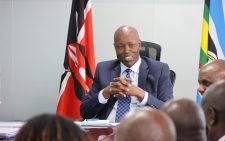Audit source of Nairobi’s sewage-laced tap water

Reports that raw sewage is seeping through taps in Umoja, Nairobi, is a monumental scandal that defies belief.
It is appalling that such a grave issue persists in a city that aspires to be a beacon of progress and development. The mere idea that every Tuesday, residents must brace themselves for contaminated water pouring from their taps is not just a health hazard but a major sign of institutional failure and societal neglect.
What is perhaps even more alarming is the silence and resignation of the people who have endured this indignity for years. The normalisation of such a crisis reveals a community trapped in learned helplessness — a psychological state where repeated exposure to stress and a perceived lack of control over a situation leave people feeling powerless to act.
In this case, Umoja residents, many of whom are hardworking, law-abiding citizens, have been forced to accept as normal the grotesque reality of sewage-laced water.
This resignation, while understandable in the face of systemic failures, is tragic and deeply concerning. Even more troubling is the question of whether this problem is being perpetuated deliberately. Given the high population density in Umoja, one cannot ignore the possibility that water vendors may have a vested interest in ensuring the fear of contaminated tap water persists. Could it be that the ongoing crisis fuels their businesses, as residents are left with no choice but to purchase water at inflated prices?
Responsibility for water supply and sewerage in Nairobi lies squarely on the shoulders of two key entities: the Nairobi City Water and Sewerage Company (NCWSC), tasked with operations, and the Athi Water Works Development Agency (AWWDA), which oversees infrastructure development.. These organisations, in theory, should work in tandem to ensure clean, safe, and reliable water supply. Yet, their glaring failure to address this issue suggests either gross incompetence or a shocking lack of priority given to the health and dignity of Umoja residents.
A few weeks ago, the sewerage system in the area was renovated, raising hopes among residents that change was finally on the horizon. But these hopes were dashed when raw sewage continued to pour from taps unabated. The question now is: what went wrong? Was the renovation flawed, or was it another example of poorly executed projects that fail to address the root causes of problems? Who will finally take responsibility and fix this mess?
This crisis demands immediate action, and the onus lies on Nairobi Governor Johnson Sakaja and the relevant water and sewerage authorities to act decisively. Sakaja, known for his pledge to bring dignity to Nairobians, must take personal responsibility for resolving this issue. It is time to hold those in charge accountable, conduct a comprehensive investigation, and implement solutions that prevent such a calamity from recurring.
The health implications of consuming sewage-laced water cannot be overstated. Residents are exposed to severe risks, including cholera, typhoid, and other waterborne diseases. Children, the elderly, and those with weakened immune systems are particularly vulnerable. Beyond the physical toll, the psychological impact of living in constant fear of contaminated water is scary. It strips people of their dignity and erodes trust in public institutions that are supposed to safeguard their well-being.
A thorough audit of the water supply system in Umoja must be conducted to identify and fix the exact points of contamination. Second, the city must invest in public awareness campaigns to educate residents about water safety and hygiene, while simultaneously providing immediate alternatives, such as clean water tanks, to affected households.
Lastly, the leadership at NCWSC and AWWDA must be held accountable for their roles in perpetuating this crisis. If they are incapable of delivering on their mandate, they must step aside for competent professionals who can. This is not just a matter of infrastructure; it is a matter of life and death.
The people of Umoja should not have to beg for clean water — a basic human right. If we cannot guarantee something as fundamental as clean water, what does that say about us as a society?
— The writer is People Daily’s Business Editor












